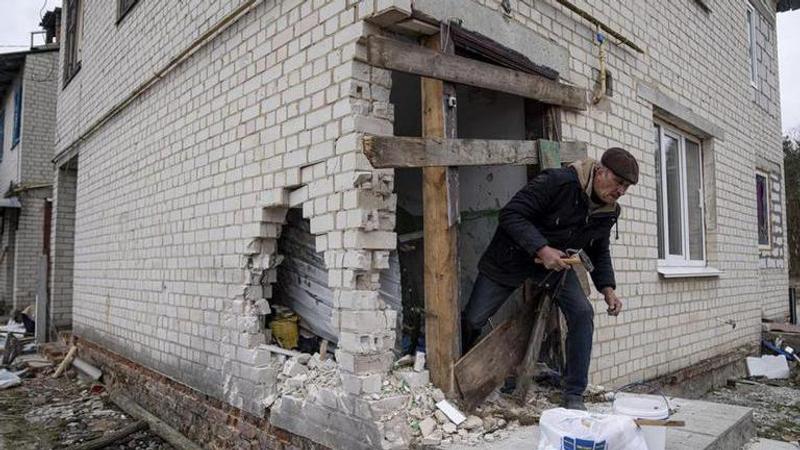Published 09:02 IST, September 4th 2022
Russia-Ukraine war: Heavy shelling forces Nikopol residents to flee
Many residents from Nikopol and other towns and villages alongside the Dnieper River, have been spending the nights in tents or in cars in the villages nearby, scared of the intensive shelling in their cities.

Many residents from Nikopol and other towns and villages alongside the Dnieper River, have been spending the nights in tents or in cars in the villages nearby, scared of the intensive shelling in their cities.
For almost two months Nikopol, located about 10 kilometers (six miles) downstream from the Zaporizhzhia nuclear plant has been under attack.
The shelling against the city and the region, has intensified in the last weeks, and the attacks that were usually at night, are taking place during the day too, said Maiia Chernysh, 59, mathematics professor and resident of Nikopol while assembling a tent together with her husband, in a small village nearby.
As many others, the couple goes back to Nikopol every morning to check on their house and where Maiia's husband works in one of the factories still functioning.
She keeps working as a teacher giving online classes. Once they finish, they leave the city to spend the night in a safer area in the Dnipropetrovsk region, not far from their hometown.
"So far it (the house) is intact, every time when we leave (Nikopol) we are worried. We are praying to God so we can get back to our house intact," said Chernysh.
She explained that last Thursday, during the visit of the head of the IAEA mission to the plant that coincided with the beginning of the school year in the country, the Russians launched their attacks in the morning and kept shelling through the day.
"It was very scary," Chernysh said, adding with optimism that Ukrainians will eventually recover their territory and continue being an independent country.
A few meters from them, two friends were playing backgammon outside their tent, and another couple was having some food, seated next to their truck where they sleep.
Serhii and Olena Sovenko are farmers, and about one month ago decided to leave Nikopol at night due to the shelling. They go back to the city every day to work.
"We have been leaving (every day) the city (Nikopol) because very often there are even 3 shellings, very strong, massive, and literally in the area where we live, 500 or 600 meters (from the house) so, we really don't want to take the risk (of spending the night there)," Serhii Sovenko explained.
He said that most of the city's population has left - more than 50% according to the authorities - and those remaining sleep in the shelters or basements.
With some of the factories still working, a lot of men remain in Nikopol while their families fled to the villages nearby.
"We left just when Nikopol became a battlefield," said Olena Kovalova, 32, who used to work in a bank before the war. She moved together with her 6-year-old son to a nearby town to remain close to her husband and to the town where she was born.
"We are afraid for our lives," she said, but "we are not afraid of the Zaporizhzhia power plant but to the people who are there", she added in reference to the Russian forces controlling the NPP.
The head of the U.N. nuclear watchdog said on Saturday the Russian-controlled Zaporizhzhia nuclear plant was disconnected to its last external power line. But the facility is still able to run electricity through a reserve line amid sustained shelling in the area.
International Atomic Energy Agency (IAEA) Director-General Rafael Grossi said in a statement Saturday that the agency's experts were told by senior Ukrainian staff that the fourth and last operational line was down.
The three others were lost earlier during the conflict. The IAEA experts arrived at Zaporizhzhia on Thursday.
The Zaporizhzhia facility, which is Europe's largest nuclear plant, has been held by Russian forces since early March, but its Ukrainian staff are continuing to operate it.
Over the past several weeks, Ukraine and Russia have traded blame over shelling at and near the plant, while also accusing each other of attempts to derail the visit by IAEA experts, whose mission is meant to help secure the site.
Seated in a park 30 kilometres (19 miles) away from the nuclear plant, Kovalova shared some time with other families from Nikopol displaced by the conflict.
For her, the accusations made by Russia that Ukraine is shelling the plant don't make any sense. "Ukraine knows what was Chernobyl, and nobody would even have in mind to shell the NPP (Nuclear power plant)".
She hopes the Russians to be kicked out from the plant or at least persuaded by the IAEA (International Atomic Energy Agency) to leave it, she explained.
"I really want to go home when everything finishes," she said before leaving the park to walk through the empty streets of the village that became her and her son's temporary home.
Updated 09:02 IST, September 4th 2022




